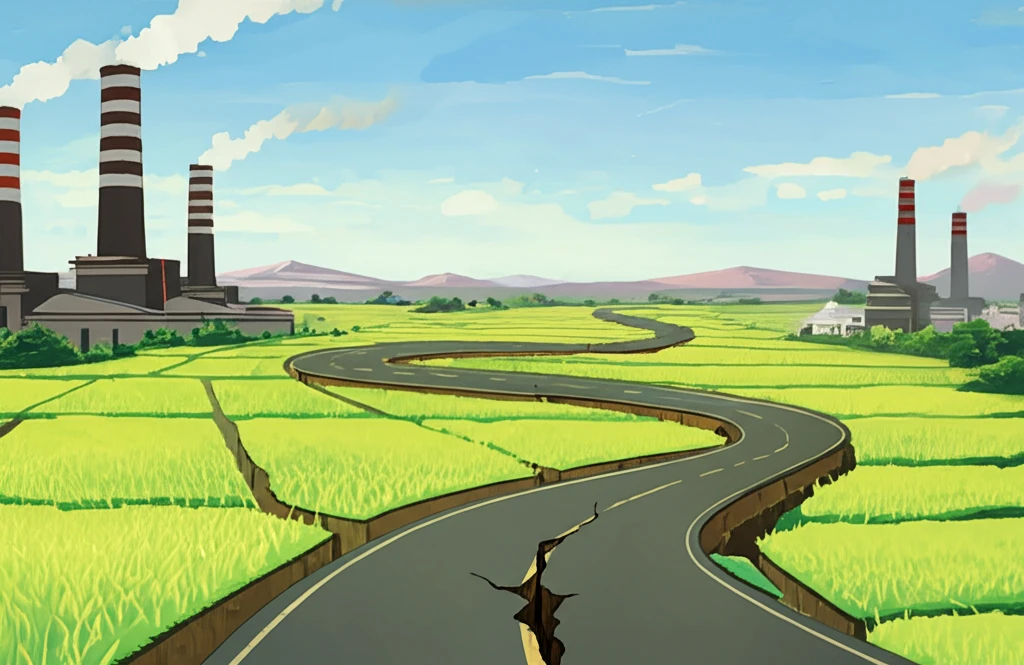
The Road Less Traveled: How Infrastructure Impacts Income Inequality in China
"Uncover the unexpected link between China's road development and the widening gap in labor income. Is better infrastructure truly benefiting everyone?"
China's rapid economic growth over the past few decades has been nothing short of remarkable. A key component of this transformation has been massive investment in infrastructure, particularly in roadways. These new roads have connected cities, facilitated trade, and spurred development across the country. However, the benefits of this infrastructure boom may not be as evenly distributed as we once thought.
A recent study has uncovered a surprising and complex relationship between road infrastructure development and income inequality in China. The research suggests that while improved infrastructure boosts economic activity, it may also contribute to a decline in the share of income going to labor, thereby widening the income gap. This challenges the conventional wisdom that infrastructure development is universally beneficial and raises important questions about the distributional effects of economic policies.
This article will delve into the findings of this study, exploring the intricate pathways through which road infrastructure impacts the labor share of income. We'll examine the role of market expansion, capital mobility, and structural transformation in shaping this relationship, and consider the policy implications for a more equitable and sustainable future for China.
The Unexpected Twist: How Roads Can Widen the Income Gap

The study's central finding is that increased road infrastructure in China is negatively correlated with the labor share of income. This means that as more roads are built, a smaller portion of the economic pie goes to workers in the form of wages and salaries. This might seem counterintuitive. Shouldn't better infrastructure create more jobs and boost incomes for everyone?
- Market Expansion and Capital Mobility: Roads facilitate the movement of goods and capital, leading to larger markets. This increased mobility benefits capital owners, who can more easily deploy their resources to maximize returns. Under China's 'hukou' system, which restricts labor mobility, workers are less able to take advantage of these expanded opportunities, further increasing the bargaining power of capital.
- Structural Transformation: As China industrializes, its economy is shifting from labor-intensive industries (like agriculture) to capital-intensive industries (like manufacturing). This shift naturally leads to a decline in the labor share of income, as capital becomes a more important factor of production. Road infrastructure accelerates this transformation by facilitating the growth of manufacturing and other capital-intensive sectors.
Charting a Course Towards Inclusive Growth
The study's findings highlight the importance of considering the distributional effects of economic policies. While infrastructure development is undoubtedly crucial for economic growth, it's essential to ensure that its benefits are shared more equitably. The researchers suggest several policy options for achieving this goal:<ul> <li><b>Reduce Labor Market Frictions:</b> Reforming the 'hukou' system to allow for greater labor mobility would empower workers to take advantage of new opportunities and increase their bargaining power.</li> <li><b>Rebalance Public Spending:</b> Shifting public spending away from road construction and towards education and healthcare would help to level the playing field and create a more skilled and healthy workforce.</li> <li><b>Improve SOE Efficiency:</b> State-owned enterprises (SOEs) can play a role in reducing inequality, but their operating efficiency must be improved to maximize their contribution to the economy.</li> </ul>By adopting these policies, China can ensure that its infrastructure investments translate into more inclusive and sustainable economic growth, benefiting all segments of society.
